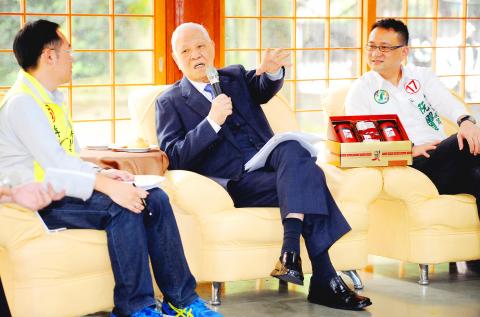Former president Lee Teng-hui (李登輝) yesterday criticized President Ma Ying-jeou (馬英九) — saying Ma makes policy decisions unilaterally — and called the nation’s democracy “fake,” advocating for a second democratic reform.
“The central government has concentrated too much power in its hands,” Lee said during a meeting with Democratic Progressive Party (DPP) Taipei City and New Taipei City councilors yesterday. “It is making decisions however it likes, without listening to the voices of the people.”
Lee cited the cross-strait service trade agreement, saying that, despite strong opposition from the public, Ma insists on forcing the legislature to pass the agreement.

Photo: Chu Pei-hsiung, Taipei Times
“The leader is not listening to the people. I always say that he [Ma] only looks into the mirror when he makes decisions,” Lee said.
He added that, although there are elections, national politics are chaotic.
“For example, facing the recent oil scandals, central and local governments are blaming each other. They should not be pointing fingers at each other, but rather they should work together to find a way to solve the problem for the public,” he said.
Lee also criticized the government’s China-leaning policies.
“What I am most concerned about now is the self-governance of Taiwan,” Lee said. “To boost Taiwan’s economy, we need more creativity.”
He also condemned businesses that rely on low-cost operations in China.
“Businesses tried to solve their problems by relocating production to China, to cut costs,” he said.
When businesses do so, they leave Taiwan with problems, including high unemployment and low salaries, Lee said.
“It is a sad thing that college graduates cannot find jobs and have to go to China or Australia to work,” Lee said. “Gradually, the distribution of wealth becomes unbalanced, those who are wealthy get wealthier, while the poor become poorer.”
He said that, when wealthy people invest in real-estate properties, housing prices skyrocket and young people are left unable to afford housing. In those situations, young people fear getting married, and even when they are married, they fear having children.
Lee also voiced his opposition to complete economic liberalization, saying that “the government should intervene and regulate when it has to.”
Lee told the city councilor candidates that they should not see themselves as “leaders” of the city, but rather as managers or executives who run the city as if they are running a business.
“There are differences between Taipei and New Taipei City, and there are also differences among different districts or neighborhoods — a good councilor is able to identify these differences and use them as selling points for different communities,” Lee said.

Taiwanese can file complaints with the Tourism Administration to report travel agencies if their activities caused termination of a person’s citizenship, Mainland Affairs Council Minister Chiu Chui-cheng (邱垂正) said yesterday, after a podcaster highlighted a case in which a person’s citizenship was canceled for receiving a single-use Chinese passport to enter Russia. The council is aware of incidents in which people who signed up through Chinese travel agencies for tours of Russia were told they could obtain Russian visas and fast-track border clearance, Chiu told reporters on the sidelines of an event in Taipei. However, the travel agencies actually applied

Japanese footwear brand Onitsuka Tiger today issued a public apology and said it has suspended an employee amid allegations that the staff member discriminated against a Vietnamese customer at its Taipei 101 store. Posting on the social media platform Threads yesterday, a user said that an employee at the store said that “those shoes are very expensive” when her friend, who is a migrant worker from Vietnam, asked for assistance. The employee then ignored her until she asked again, to which she replied: "We don't have a size 37." The post had amassed nearly 26,000 likes and 916 comments as of this

US President Donald Trump said "it’s up to" Chinese President Xi Jinping (習近平) what China does on Taiwan, but that he would be "very unhappy" with a change in the "status quo," the New York Times said in an interview published yesterday. Xi "considers it to be a part of China, and that’s up to him what he’s going to be doing," Trump told the newspaper on Wednesday. "But I’ve expressed to him that I would be very unhappy if he did that, and I don’t think he’ll do that," he added. "I hope he doesn’t do that." Trump made the comments in

New measures aimed at making Taiwan more attractive to foreign professionals came into effect this month, the National Development Council said yesterday. Among the changes, international students at Taiwanese universities would be able to work in Taiwan without a work permit in the two years after they graduate, explainer materials provided by the council said. In addition, foreign nationals who graduated from one of the world’s top 200 universities within the past five years can also apply for a two-year open work permit. Previously, those graduates would have needed to apply for a work permit using point-based criteria or have a Taiwanese company